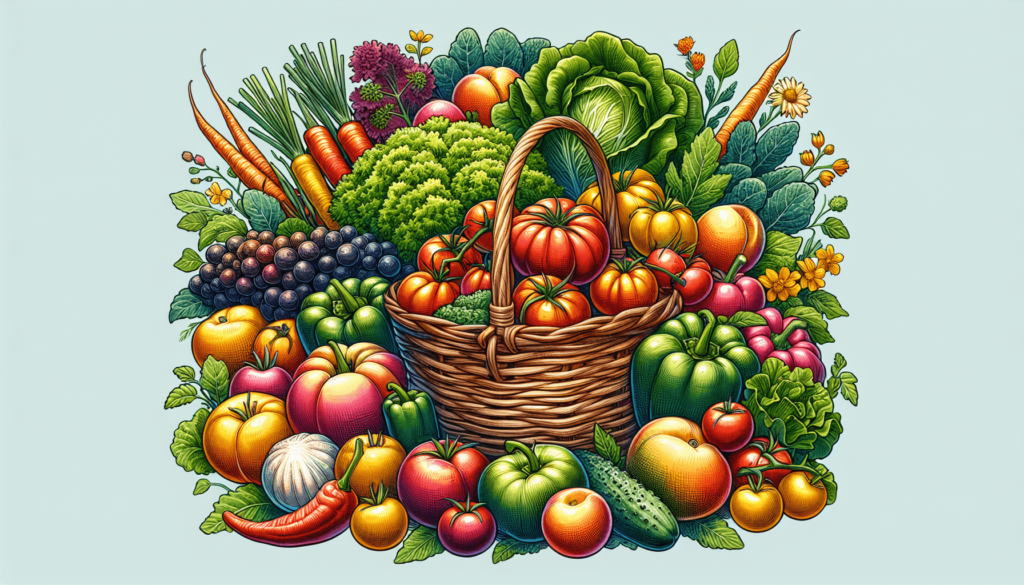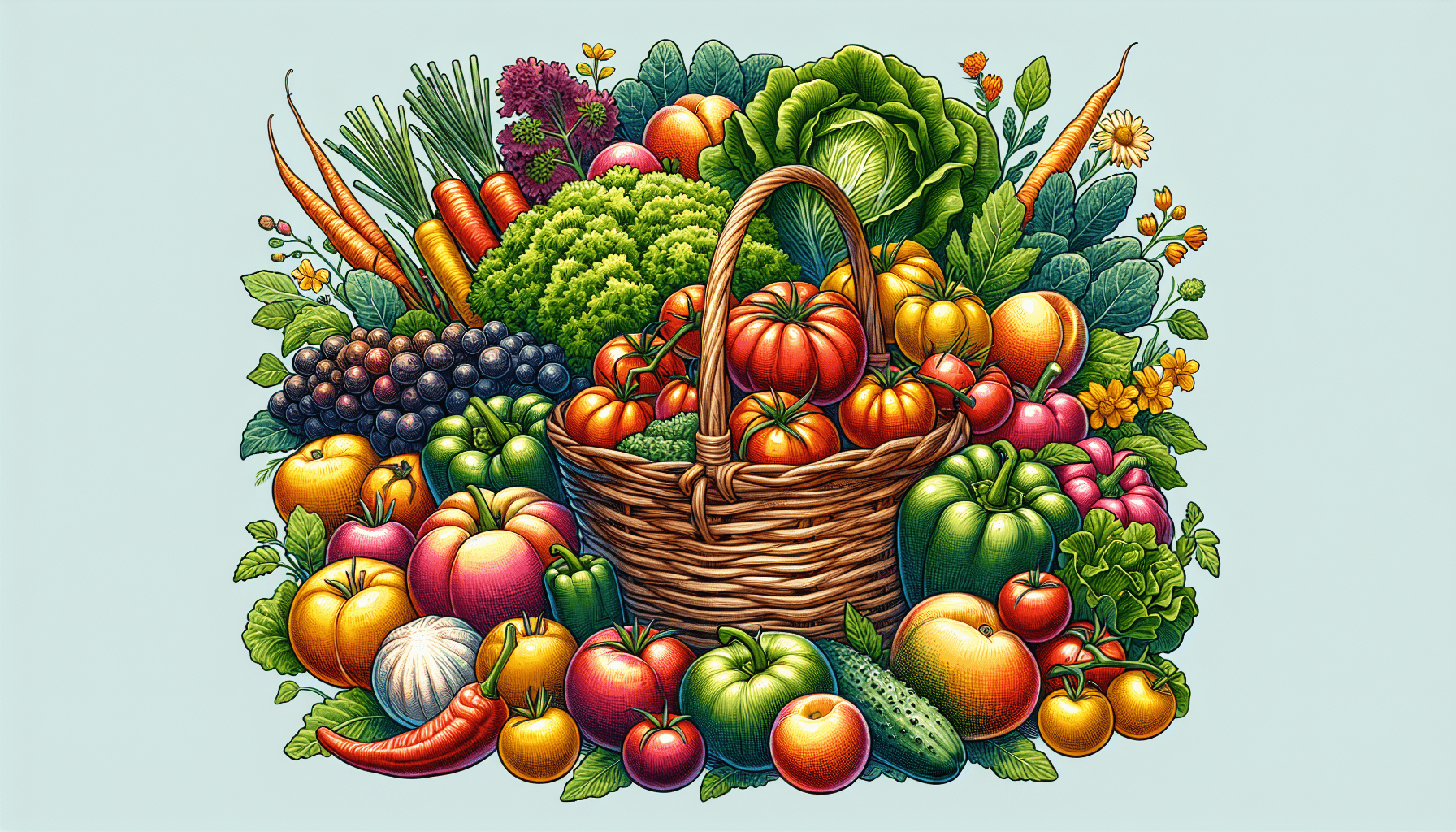Did you know that supporting local farmers has a significant impact on our communities and the environment? By choosing to buy locally grown produce and goods, you not only help boost the local economy, but also contribute to the preservation of farmland and the reduction of carbon emissions. Today, we will explore the importance of supporting local farmers and how it positively influences our lives and the world around us.

1. Economic Benefits
1.1 Job Creation
Supporting local farmers not only ensures the availability of fresh and nutritious produce, but it also creates employment opportunities within the community. When you choose to purchase locally grown products, you contribute to the growth of local agricultural businesses, which, in turn, leads to the creation of jobs for farmers, farm workers, and other individuals involved in the agricultural sector. By supporting local farmers, you are directly helping to maintain and increase employment opportunities in your community.
1.2 Stimulating Local Economy
Buying from local farmers has a significant impact on the local economy. When you choose to support local farmers, the money you spend stays within the community, benefiting the local businesses and economy. Local farmers often spend their income on various goods and services within the community, such as equipment, supplies, and other local businesses. This circulation of money helps stimulate economic growth, leading to a healthier and more vibrant local economy.
1.3 Increased Tax Revenue
Supporting local farmers also has indirect economic benefits through increased tax revenue. When local farmers thrive and their businesses grow, they generate income and profits, resulting in higher tax contributions. This additional revenue can be used by local governments to invest in infrastructure, education, healthcare, and other public services, ultimately benefiting the entire community. Through supporting local farmers, you are contributing to the financial well-being of your community and helping to fund essential public services.
2. Environmental Benefits
2.1 Preserving Biodiversity
Local farmers often employ sustainable and diverse farming practices that help preserve biodiversity in the region. By supporting local farmers, you are directly contributing to the preservation of diverse plant and animal species. Unlike large-scale industrial farming, local farmers often prioritize crop rotation, companion planting, and the preservation of natural habitats. These practices promote biodiversity by creating a balanced ecosystem that supports a wide range of organisms, including pollinators and beneficial insects.
2.2 Reducing Carbon Footprint
Buying locally grown produce significantly reduces the carbon footprint associated with food production and transportation. The environmental impact of transporting food over long distances is substantial, as it involves the emission of greenhouse gases from vehicles. By supporting local farmers, who are typically located nearby, you reduce the distance that food needs to travel, minimizing the carbon emissions associated with transportation. Choosing local also encourages farmers to use more sustainable farming methods, such as organic or regenerative practices, which further reduces the environmental impact of food production.
2.3 Protecting Natural Resources
Local farmers are often deeply connected to the land they cultivate and understand the importance of safeguarding natural resources. By supporting them, you contribute to the protection of these resources. Local farmers prioritize responsible water use, soil conservation, and minimizing agricultural runoff. They work towards improving soil health, using natural fertilizers, and reducing reliance on harmful chemicals. By supporting local farmers, you join forces in protecting natural resources, ensuring their sustainability for future generations.
3. Health Benefits
3.1 Fresher and Nutrient-Rich Produce
One of the most evident benefits of supporting local farmers is gaining access to fresher and more nutrient-rich produce. Locally grown fruits and vegetables are harvested at their peak freshness, maximizing their nutritional value. Unlike produce that may travel long distances or spend extended periods in storage, locally sourced produce reaches your plate sooner after harvesting, ensuring optimal taste and nutrient content. By choosing local, you prioritize your health and well-being by incorporating truly fresh and wholesome foods into your diet.
3.2 Fewer Chemicals and Pesticides
Many local farmers prioritize organic or pesticide-free farming practices, reducing the exposure to harmful chemicals in food. Small-scale farmers often have the flexibility to implement more sustainable and natural pest control methods, minimizing the need for synthetic chemicals. By supporting local farmers, you can have greater confidence in the safety and quality of the food you consume, knowing that it is grown with responsible practices that prioritize your health as well as the environment.
3.3 Promoting Sustainable Farming Practices
Supporting local farmers goes hand in hand with promoting sustainable farming practices. Local farmers, typically having a deep understanding of their land and its limitations, aim to create a sustainable and self-sufficient agricultural system. They invest in soil health, crop rotation, and natural fertilizers, prioritizing long-term sustainability over short-term gains. By supporting local farmers, you play an active role in encouraging and reinforcing these sustainable practices, creating a healthier planet and a more sustainable food system.
4. Community Support
4.1 Maintaining Rural Identity
Supporting local farmers is not only about the food you eat but also about preserving the unique rural identity of your community. Local farmers often shape the cultural landscape of rural areas, contributing to the region’s traditions and way of life. By buying from local farmers, you help maintain the authenticity and charm of rural communities, ensuring that generations to come can experience and appreciate their distinctive character.
4.2 Strengthening Local Food Systems
By supporting local farmers, you contribute to the development and strengthening of local food systems. Local food systems prioritize shorter supply chains, allowing consumers to have a direct relationship with the producers. This increased transparency builds trust and fosters a stronger connection between farmers and consumers. By actively participating in your local food system, you support the growth of farmers’ markets, Community Supported Agriculture (CSA) programs, and other initiatives that promote local and sustainable food production.
4.3 Building Stronger Relationships
When you choose to support local farmers, you actively participate in building stronger relationships within your community. Buying directly from local farmers provides a unique opportunity to interact with the individuals who grow your food. You can ask questions, learn about their farming practices, and gain a deeper understanding of the food you consume. These personal connections foster a sense of community, as you build relationships based on trust and mutual support. By supporting local farmers, you invest in the social fabric of your community, creating a stronger and more connected society.

5. Food Security
5.1 Reducing Dependency on Imports
Supporting local farmers plays a crucial role in reducing dependency on food imports. By diversifying the food supply within your community, you help strengthen local food security. Dependence on imported goods can leave communities vulnerable to disruptions in supply chains, such as natural disasters or global crises. By supporting local farmers, you contribute to a more resilient and self-sufficient food system, reducing the risks associated with external factors that can affect the availability and affordability of essential food items.
5.2 Ensuring Access to Fresh Food
For some communities, particularly those in remote or underserved areas, accessing fresh and nutritious food can be a challenge. By supporting local farmers, you help ensure that all members of your community have access to fresh, locally grown produce. Local farmers often prioritize providing their goods to nearby communities, ensuring that everyone can access fresh food regardless of their location. Through supporting local farmers, you actively contribute to improving food accessibility and promoting healthier eating habits across your community.
5.3 Resilience during Crises
During times of crisis, such as natural disasters or global emergencies, supporting local farmers becomes even more critical. Local food systems typically have shorter supply chains, making them more resilient and adaptable to disruptions in the broader food system. By supporting local farmers, you contribute to the overall resilience of your community, ensuring a steady supply of food even during challenging times. This food security not only benefits individuals but also provides stability and peace of mind for the entire community.
6. Cultural Preservation
6.1 Preserving Traditional Farming Methods
Supporting local farmers is often synonymous with preserving traditional farming methods that have been passed down through generations. Local farmers often employ techniques and knowledge that have been honed and refined over many years. By purchasing their products, you actively contribute to the preservation of these traditional farming practices. These methods not only maintain cultural heritage but also often promote sustainability and harmony with the natural environment.
6.2 Supporting Culinary Heritage
Local farmers play a crucial role in supporting and preserving culinary heritage within their communities. They often cultivate unique and traditional crops, some of which may have cultural and historical significance. By supporting local farmers, you help sustain these traditional crops, ensuring that they continue to be part of local cuisines and cultural practices. Supporting local culinary heritage creates a diverse and vibrant food culture, allowing for the celebration of community traditions and flavors.
6.3 Celebrating Local Food Culture
When you choose to support local farmers, you also embrace and celebrate local food culture. Each community has its own culinary preferences, traditional recipes, and flavors that are deeply rooted in the local food culture. By buying from local farmers, you actively participate in the celebration of these culinary traditions. Whether it’s enjoying regional specialties or discovering new ingredients, supporting local farmers allows you to embark on a culinary journey that honors and respects the unique food traditions of your community.
7. Knowledge Exchange
7.1 Sharing Farming Techniques
Supporting local farmers creates opportunities for knowledge exchange. By engaging with farmers and learning about their practices, you can gain valuable insights into sustainable farming techniques. Local farmers often have a wealth of knowledge built upon years of experience and experimentation. Through supporting local farmers, you can foster a collaborative environment that encourages the sharing of farming techniques and best practices. This knowledge exchange benefits not only the farmers themselves but also the entire agricultural community striving for sustainable and regenerative practices.
7.2 Education and Awareness
Supporting local farmers provides educational opportunities to learn about the importance of sustainable agriculture. Local farmers often host educational events, farm tours, and workshops to raise awareness about their practices and the principles behind sustainable farming. By actively participating in these events, you not only gain valuable knowledge but also contribute to the broader goals of fostering sustainable practices within your community. Education and awareness play a vital role in building a more sustainable future, and supporting local farmers facilitates this process.
7.3 Promoting Sustainable Practices
By supporting local farmers, you become an advocate for sustainable farming practices. Your consumer choices send a powerful message to larger agricultural industries about the demand for sustainable and locally sourced products. Supporting local farmers encourages others to adopt more sustainable practices, raising the bar for the industry as a whole. Through your support, you actively contribute to the widespread adoption of responsible farming techniques, helping to create a more sustainable and resilient agricultural system.
8. Supporting Animal Welfare
8.1 Promoting Ethical Farming Practices
Local farmers often prioritize animal welfare in their farming practices. By supporting them, you contribute to the promotion of ethical farming methods. Local farmers tend to have smaller-scale operations, allowing them to provide better care and attention to their animals. This often translates to improved living conditions, access to natural habitats, and reduced use of antibiotics and hormones. When you choose to buy from local farmers, you actively support the movement towards more ethical treatment of animals within the agricultural industry.
8.2 Reducing Animal Transportation
Supporting local farmers means reducing the distance that livestock needs to travel for processing and distribution. This reduced transportation distance not only minimizes stress on the animals but also reduces carbon emissions associated with animal transportation. Choosing to consume locally raised meat and dairy products ensures that the animals are subjected to shorter and less stressful journeys, promoting their welfare and reducing the overall environmental impact of the food system.
8.3 Encouraging Humane Treatment
By supporting local farmers, you actively encourage humane treatment of animals within the agricultural sector. Local farmers generally prioritize building a closer relationship with their animals, taking a more hands-on approach in their care. This often results in lower-stress environments, as the animals are treated with compassion and respect. By actively choosing farmers who prioritize humane treatment, you support the shift towards a more ethical and compassionate approach to animal farming.
9. Resilience to Climate Change
9.1 Diversifying Agricultural Systems
Supporting local farmers leads to the diversification of agricultural systems, which is crucial in building resilience to climate change. Local farmers often cultivate a wider variety of crops, including native and climate-adapted species. This diversification helps mitigate risks associated with climate change, such as changes in temperature, precipitation patterns, and pest pressures. By supporting local farmers, you contribute to the development of resilient agricultural systems that can better withstand the challenges posed by a changing climate.
9.2 Adaptation and Mitigation Strategies
Local farmers are often at the forefront of developing adaptation and mitigation strategies to address the impacts of climate change. They implement practices such as water conservation, soil carbon sequestration, and the use of renewable energy sources. By supporting local farmers, you support their efforts in combating climate change and contribute to the implementation of climate-smart agricultural practices. These strategies not only benefit the environment but also help ensure the long-term viability of local agricultural systems.
9.3 Enhancing Food System Resilience
Supporting local farmers enhances the overall resilience of the food system in the face of climate change. As climate-related challenges intensify, it becomes crucial to have robust and adaptable food systems that can continue to provide a stable food supply. By supporting local farmers, who focus on sustainable and climate-resilient practices, you contribute to building a more resilient food system that can withstand climatic shocks and ensure the availability of food for the community, even in the face of adversity.
10. Economic Equality
10.1 Addressing Food Deserts
Supporting local farmers plays a significant role in addressing food deserts, which are areas lacking access to affordable and nutritious food. By promoting local agriculture, you contribute to the availability of fresh, affordable, and locally sourced produce in underserved communities. Local farmers’ markets, cooperatives, and other initiatives help bridge the gap and ensure that everyone has access to quality food, regardless of their socio-economic status. By actively supporting local farmers, you contribute to reducing food inequality and improving the overall well-being of underserved communities.
10.2 Increasing Access to Fresh and Affordable Produce
Local farmers often offer more affordable prices for their products compared to large-scale industrial operations. By choosing to purchase from local farmers, you ensure that fresh and nutritious food is accessible to all members of your community, regardless of their income level. This increased accessibility to fresh produce can have a significant impact on the overall health and well-being of individuals, particularly those who may have limited financial resources. By supporting local farmers, you actively contribute to promoting economic equality through improved access to healthy and affordable food choices.
10.3 Supporting Small-Scale Farmers
Supporting local farmers is synonymous with supporting small-scale farmers who often face numerous challenges in the current agricultural landscape. Large-scale industrial agriculture dominates the market, often making it difficult for small-scale farmers to thrive. By choosing to buy from local farmers, you directly support their businesses and livelihoods. This support allows small-scale farmers to continue their operations, preserve their way of life, and provide for their families. By supporting small-scale farmers, you contribute to maintaining a diverse and vibrant agricultural sector while also promoting economic equality within your community.

